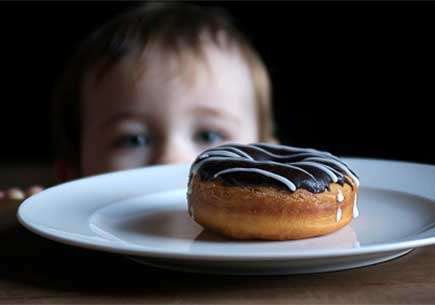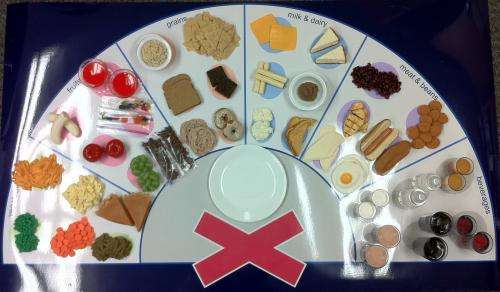What preschoolers know about healthy eating

When you hand a preschooler a donut, does she know it's junk food? The answer is yes, says University of Michigan researcher Kristen Harrison.
Harrison, professor of communication studies and faculty associate at the U-M Institute for Social Research, studies predictors of early-childhood obesity by investigating the impact of family TV exposure on what preschoolers eat and what these young kids think about healthy eating. She believes the information may help predict the kinds of decisions preschoolers make about food as they grow older.
She says that doing research on 3- and 4-year-olds can be challenging, since kids that age can't necessarily verbalize what they're thinking or what they know. Her solution? The Placemat Protocol.
Harrison created a giant plastic placemat with six pie-shaped sections, each labeled with a different food group, such as beverages or milk and dairy. Preschoolers are asked to assemble a meal they would most like to eat if they could eat anything by placing plastic toy foods—three healthy and three "junky"—in each of the different food sections on the placemat. The kids are then be asked to put together a healthy meal.

Harrison and colleague Mericarmen Peralta conducted the Placemat Protocol with 250 children at 18 preschools in Washtenaw, Wayne and Jackson counties over a two-year period. They asked them questions about food brand recognition and obtained body mass index measurements. They also interviewed parents about family characteristics, including how much commercial television the family watches and what their child eats.
They found that preschoolers who watched more TV were more likely to eat foods that could lead to obesity and more likely to assemble meals consisting of junk food.
The results are important, Harrison says, not only because they show that TV ads are giving kids the wrong idea about what foods are healthy, but also because kids who eat too much junk food at an early age and put on extra pounds are more likely to grow up obese.
"The next step, of course, would be to see if those perceptions in preschool actually predict their food choice behaviors over time," Harrison said. "Because when it comes to obesity, prevention is where it's at. Parents are struggling with their own situations—they're constrained by family circumstances. But if you can get the kids to make choices that in the long run are going to benefit them, that's the way to go."
















